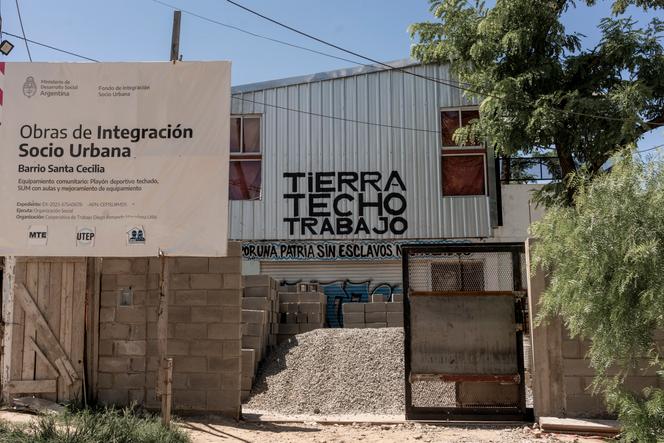


It was 10 am early in the week, and calm was prevailing in the Santa Cecilia district of Gonzalez Catan, some 30 kilometers southwest of Buenos Aires. Its dirt streets, where every step raises a cloud of dust, make this difficult neighborhood built on the edge of a former quarry, a section of which has been converted into an open-air landfill, look like a village.
Two years ago, this is where the Movement of Excluded Workers (MTE), an Argentine social movement created in 2002 during the country's crisis, opened a new community center, La Tosquera ("the quarry" in Spanish). On the facade of its two-story building, made of cinder blocks and corrugated iron sheets, is the movement's motto in capital letters: "Tierra, Techo, Trabajo ['Land, Roof, Work']."
Adriana Rolon, 42, the facility's coordinator, proudly showed us around. A small kitchen, where Estefani, Claudia, and Noelia were busy working, leads to a common room that opens onto a small soccer pitch. With the new school year just a week away, some 30 children and teenagers were active on the second floor. The youngest played board games and drew, while the eldest took part in an art workshop.
"Here, we try to provide support on every level: academic, nutritional, psychological... There's also a program for addiction treatment," Adriana explained. Having started working here shortly before the election of Argentina's president, Javier Milei, "at the worst possible time," she hasn't forgotten her first days at La Tosquera. "We open at 8:30 am. On my first day, I was surprised to see a line of kids waiting outside the door before I arrived. I said to my colleagues, 'They're really motivated!" she recalls. "One of them replied: 'It's not because they want to, it's because of hunger.'"
Until a few months ago, the center used to host around 60 children outside school hours. Despite the crisis and inflation, the Santa Cecilia MTE was able to provide around 100 meals a day to local families, largely thanks to food sent by the state. "Today, we can barely cover the center's 40 allocated spots. We feed the children first, breakfast and lunch, and when there's enough food, the adults who work here also eat," she lamented.
The situation has deteriorated with each passing day since Milei came to power on December 10, 2023. Inflation accelerated at a crushing rate for the population in the wake of the brutal 51% devaluation of the Argentine peso decided by the government barely two days after the libertarian's investiture: A 25.5% surge in December 2023 was followed by a further 20.5% in January, bringing inflation to 256% over one year. The percentage of the population living in poverty rose from 49.5% in December 2023 to 57.4% in January, according to an indicator compiled by the Catholic University of Argentina, and is expected to increase in February and March.
You have 58.34% of this article left to read. The rest is for subscribers only.
